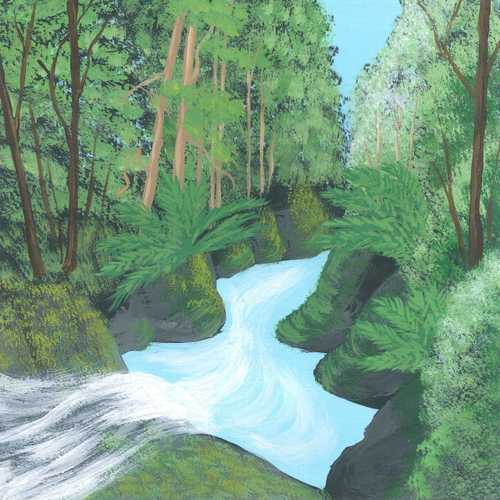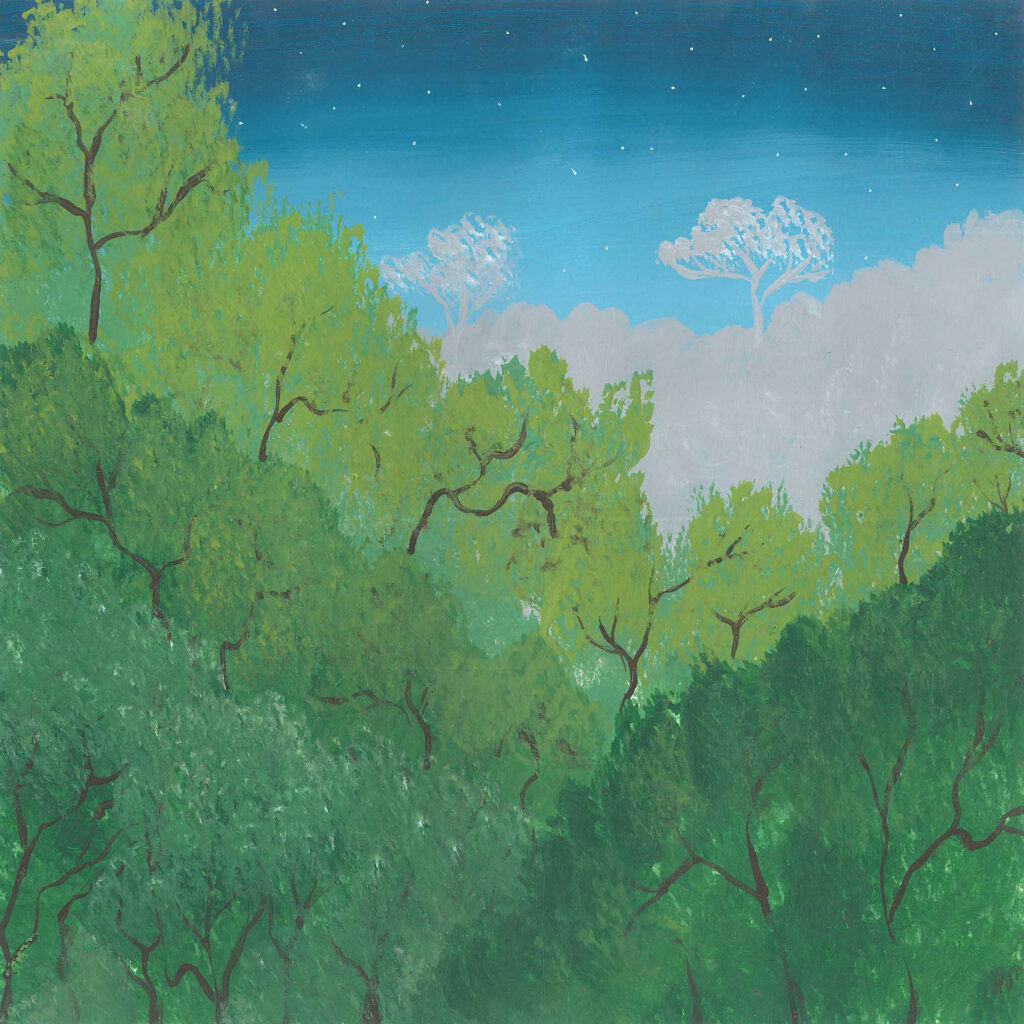
Ciao amico*. 👋
Why is the loss of glaciers due to increasing temperatures so significant, and can recordings of this process have a beneficial effect? Does the gentle flow of a stream in the Brazilian countryside sound as inviting as you might imagine?*² Why do we continue to poison our gardens with toxic chemicals? How quickly can woodland re-establish itself on former farmland? And, what does an owl know?
Read on to find out.
*“Hello, friend” in Italian.
*²Spoiler: it really does.
Soundscape of the week
‘Windy Day in a Beech Forest’:
The ancient beech forest in the Bracciano-Martignano Regional Natural Park, in the Italian administrative area of Lazio, is recognized as a UNESCO World Heritage Site due to its biodiversity and unusually low altitude. Beeches generally grow at altitudes of 1,000m and above, but due to the conducive soil conditions and ample rainfall of this volcanic region, the trees grow as low as 350-400m above sea level (meaning that they are known as ‘depressed’ beech forests).
To capture the quintessentially bucolic sounds of this recording, Fabrizio Furnari suspended his microphones from one of the beeches, on opposite sides of its trunk; the resulting calls of songbirds and the soughing of the wind will make you feel vicariously refreshed.
Articles and essays
🧊 “Continued increases in ocean temperatures and the melting of sea ice and glaciers will alter ‘regional hydrology’ (the movement, distribution, and management of water), and further disrupt ocean currents and weather patterns. Fisheries will be affected; coastal communities will ‘face billion-dollar disaster recovery bills as flooding becomes more frequent and storms become more intense’; polar wildlife will lose its habitats.”
For these reasons, ‘The Sounds of Ice and Why We Should Be Listening’ discusses the part that recordings of glacial ice – with their “vertiginous drone[s]”, “allegro[s] of snaps and pops”, “plangent rumble[s]”, and “fusillades of tiny pops from escaping air” – may have to play in retaining the public’s interest in the loss of glaciers and the commensurate threat of sea level rise.
🏞 The prelapsarian atmosphere of the Soundscape of the Week is continued by ‘Tiny Little River’, a recent episode of earth.fm podcast Wind Is the Original Radio. Let yourself be transported to “a warm autumn morning in the countryside of [the state of] Rio de Janeiro.
“A small river flows in the middle of the forest vegetation. Various little birds fly around it. Insects can be heard in the distance.” The streamwater burbles so evocatively in Verónica Cerrotta’s recording that it’s almost impossible not to paint a picture in the mind’s eye of crystal clear water tumbling over mossy rocks, among the glossy foliage of the understorey forest layer growing around it.
Further episodes of the podcast are available on Apple and Google podcasts, Spotify, and Stitcher. New installments are released every Friday.

From the extended community
☠️ “[Given that biodiversity is in crisis,] it seems ludicrous that we can buy and use these poisons [weedkillers and insecticides], which can affect all the wildlife in our gardens from bees and other insect pollinators to birds, bats, frogs, toads and hedgehogs.”
‘Stop the Poison: Time to Rethink Pesticide Use in Our Gardens’, from the Radicle Substack, a newsletter by Decolonise the Garden, questions the way that gardeners have been persuaded that it is necessary to use toxic and even carcinogenic chemicals (<cough> Monsanto’s Roundup) to kill plants and insects which are deemed undesirable.
Not only is the notion that a domestic lawn needs to be fit for a game of boules esthetically questionable, the use of these substances demonstrates, at best, a worrying ignorance of their cost, and at worst, total contempt for the natural world. (Earlier this year, a petition calling for a ban on the sale of non-organic pesticides to the general public scraped only slightly more than 10% of the 100,000 signatories required to gain a response from the UK government.)
🦉 Biologist and writer David George Haskell has shared a short video in which he enthusiastically endorses Jennifer Ackerman‘s new nonfiction book, What an Owl Knows, which “pulls back the curtain on the nature of the world’s most enigmatic group of birds”, “illuminat[ing] the[ir] rich biology and natural history […] and reveals remarkable new scientific discoveries about their brains and behavior”.
🦌 ‘Monks Wood Wilderness: 60 Years Ago, Scientists Let a Farm Field Rewild – Here’s What Happened’ tells the story of the Monks Wood Wilderness experiment, a now 60-years-old “rewilding study [from] before the term existed”. In 1961, the barley crop on a four-hectare arable field was harvested for the last time, plowed… and abandoned. The article lays out the stages of growth that the area has gone through over the intervening decades – demonstrating the way in which “new woodland generates itself” – and the wildlife which has come to inhabit it, from various bird species to rabbits, hares, and deer.
The result is a portrait of natural regeneration which it may be difficult not to wish could be more widely encouraged.
👉 Follow us on Twitter for a daily dose of nature-sound inspiration!
How to support earth.fm
All 600+ of our curated, immersive soundscapes are free to listen to, but if you want to help us grow new forests, please become a supporter!
There are three options available, and you will also be able to favorite recordings, create and share playlists, and many other perks – plus a big surprise is coming exclusively to members in the next few weeks!
Until next time, we wish you a regenerative week. 🙏
With best wishes,
Neil and Team earth.fm
Reach out on hello@earth.fm 👋
Forward this newsletter to anyone who would appreciate it ✉️
Join the conversation with the Earth.fm community 🤝
Submit a recording 🎤
Follow us on Twitter. Instagram and YouTube 💻
Listen to nature sounds in your browser by installing our free extension 🎧
Earth.fm is a completely free streaming service of 1000+ nature sounds from around the world, offering natural soundscapes and guided meditations for people who wish to listen to nature, relax, and become more connected. Launched in 2022, Earth.fm is a non-profit and a 1% for the Planet Environmental Partner.
Check out our recordings of nature ambience from sound recordists and artists spanning the globe, our thematic playlists of immersive soundscapes and our Wind Is the Original Radio podcast.
You can join the Earth.fm family by signing up for our newsletter of weekly inspiration for your precious ears, or become a member to enjoy the extra Earth.fm features and goodies and support us on our mission.
Subscription fees contribute to growing our library of authentic nature sounds, research into topics like noise pollution and the connection between nature and mental wellbeing, as well as funding grants that support emerging nature sound recordists from underprivileged communities.

